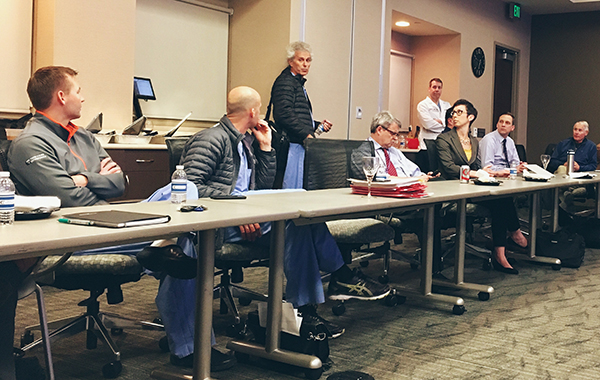
March 9, 2017 - TCO
TCO’s research and education vital to patients
Athletes get better at their respective sports through practice and dedication, finding new ways to improve their on-field performance. Research and education play similar roles in the lives of physicians.
The Research and Education Department at Twin Cities Orthopedics expands knowledge and improves the practice of medicine. An internal team dedicated to research and education tirelessly works toward a goal of providing reliable care to patients.
Results can change or modify surgical procedures to improve patient outcomes, and they provide confirmation that a particular treatment has its expected and desired outcome.
“Orthopedics is a fast-changing section of medicine. If you participate in research, you could potentially play a role in shaping treatment options,” Dr. Chris Coetzee said. “At a minimum, staying involved in research, and paying attention to what is published, one will not fall behind in your treatment of patients.”
Participation
Research and education help answer physicians’ and patients’ questions about how to manage problems and help determine outcomes for new or unique treatments and procedures; it keeps health care providers honest in regard to their own patient outcomes, too.
“I enjoy participating in research with TCO for several reasons,” Dr. Scott Anseth said. “With a group our size we have a real opportunity to not only evaluate the outcomes of our treatments but the value of those treatments to patients, hospitals and payers. From our data we can make significant improvements in how orthopedic care is delivered to patients.
“Research within TCO challenges us as surgeons as we strive to provide the highest level of care for our patients. It builds a sense of community within TCO. I love discussing what my colleagues are doing and how it has changed their practice and may possibly change mine.”
A lifetime of learning is important in any discipline. Research allows experts to not only learn from their own work but also the research of others. The work gives some of the most-respected minds in the field a chance to work together and compare notes.
“Research and education provide an avenue to collaborate with thought leaders around the world,” Dr. Chris Larson said. “This allows us to further advance our subspecialty fields.”
“Research and dissemination of that research is vital for the advancement of knowledge throughout sports medicine and orthopedic fields and to teach others in the evaluation and care of specific athletes,” said Dr. Brad Moser.
Dr. Corey Wulf said, “Research and education are vital to the evolution of medicine. Research advances medicine by using scientific methods to answer questions, solve problems and draw conclusions. By participating in research and education, we advance our own knowledge as well as those with which we work, all for the benefit of our patients.”
Goal of research and education
The goal of medical research is to question conventional wisdom, compare newer methods with traditional techniques, and ensure patients are receiving the best possible care. Long-term follow-up studies help educate and inform patients of what to expect after a specific treatment regimen.
“Ultimately research helps to dictate how we practice and treat injuries based on short- and long-term outcomes,” Dr. Larson said. “In addition to helping clinicians with regards to delivery of health care, research allows us to discuss expectations with our patients in order for them to be better prepared for the journey ahead and choose the best possible individualized treatment option.”
Because of research, evidence-based medicine exists. A physician’s instincts regarding treatment success and failures are important, but they need evidence to support those instincts and deliver for their patients, Dr. Larson said.
“Being in a practice that promotes research and quality patient care is a recipe for success,” said Brandon Schomberg, DPT, OCS, SCS, CSCS. “Research in itself can be time consuming, but collaborating together as a team, with one goal in mind, we can continue to exceed patient expectations, which is the ultimate reward. This is done by utilizing best-practice habits, thinking outside the box and being the leaders in orthopedic care and rehabilitation for successful recovery.”

Benefits of research
When the Research and Education team at TCO comes up with novel ideas or outcome-based recommendations, the organization, all medical care providers and patients, and the community at large, benefit through reliable care and improved outcomes.
“What we see in our clinical practices, the problems we evaluate and help patients with, drive the questions we seek to answer with our research,” Dr. Greg Lervick said. “Ultimately, it comes down to what will benefit the patient or athlete, what will help them recover or return to play most effectively. Being active in research helps us determine what is safe and effective and what isn’t helpful.”
“As a large group that is involved in research, we confirm our commitment to continuously improve the care we provide,” Dr. Coetzee said.
Research shines a spotlight on TCO. Results are published in peer reviewed journals that reach physicians around the world, which positively affects care and positions TCO on the cutting edge as a leader from a health care standpoint.
“Given the complexity and volume of patients we treat, we have a unique opportunity and responsibility to educate providers across the country and the globe,” Dr. Jeffrey Seybold said. “We have multiple providers who contribute through teaching at conferences and webinars, as well as writing articles and collaborating on research projects.”
“Patients who recognize that TCO supports and produces significant research will feel confident that they are being cared for by the best and the brightest with the most advanced, up-to-date treatments,” Dr. Larson said.
Becky Stone, MS, ATC, is the Research and Education supervisor and has worked with TCO physicians for more than 10 years. She has hands-on experience with the benefits of research being she and her team has contact with the patients who are involved with the studies.
“There are many upsides to working in research,” Stone said, “but one of the greatest is seeing patients’ progress. We see them before surgery and follow them annually after surgery.”
Ginny Gross, one of Dr. Coetzee’s patients and study participants, received a total ankle replacement in 2008 after years of problems from a ski accident. Today, at 77 years old, she leads a normal, active life.
“I resumed my rollerblading, hiking and travel, which has now become my passion,” Gross said. “I can’t thank TCO enough for giving me my life back free of pain and putting a huge smile on my face.”
Research examples
- Coetzee’s myriad high-quality research projects have taken him from continent to continent as a speaker at orthopedic conferences.
His research paper on the management of Lisfranc injuries has been quoted numerous times. Other examples of his work include newer options for bunion surgery and ankle replacement surgery. Currently, he’s working on a study about new and improved methods for managing ankle ligament instabilities. - Much of Dr. Larson’s personal research resides in the field of hip sports medicine and preservation, but he recently has had two articles published on ACL reconstruction. One evaluated the outcomes after ACL surgery in patients with open growth plates, and the other evaluated ACL outcomes in patients with generalized hypermobility compared to those without.
- When it comes to the hips, a prospective, multicenter study looking at complications after hip arthroscopy utilizing a validated grading classification recently was published, and TCO was the lead site. The study took four years to complete, and Dr. Larson says it was informative for surgeons and patients and will be cited for years to come.
- Lervick’s research involves the upper extremity, specifically the shoulder and elbow. He participated in several multicenter studies in 2016 that involved an implant with rotator cuff tears and outcomes following acute triceps repair comparing two different methods. Of particular interest to Dr. Lervick and the research team is the ongoing follow-up on cartilage problems in the elbow after publishing the short-term follow-up several years ago.
- John Sherman’s research is focused on new lumbar spine technology to enhance outcomes for microdiscectomies. His studies frequently involve European colleagues.
- Clinical trials are a part of research, too. Nancee Meuser, a longtime marathoner and running coach, was unable to run before participating in a juvenile cartilage implant clinical trial for her knee at TCO led by Dr. Wulf and Stone. “The knee surgery enabled me to run and race again without pain,” Meuser said. “As a runner, that is life. I’m forever grateful to Dr. Wulf and his team, including athletic trainer Brittany Widman, at TCO.”
Other physicians and health care experts who participate in research at TCO include Dr. John Anderson, Dr. Brian Bjerke, Dr. Matthew Butterfield, Meredith Butulis, DPT; Dr. Thomas Comfort, Dr. Patrick Ebeling, Dr. Christie Heikes, Dr. Ryan Hess, Dr. Scott Holthusen, Dr. Paul Langer, Dr. Steven Meisterling, Lawrence Nilsson, PA-C; Dr. Frank Norberg, Dr. Owen O’Neill and Kathryn Samuelson, PA-C.

